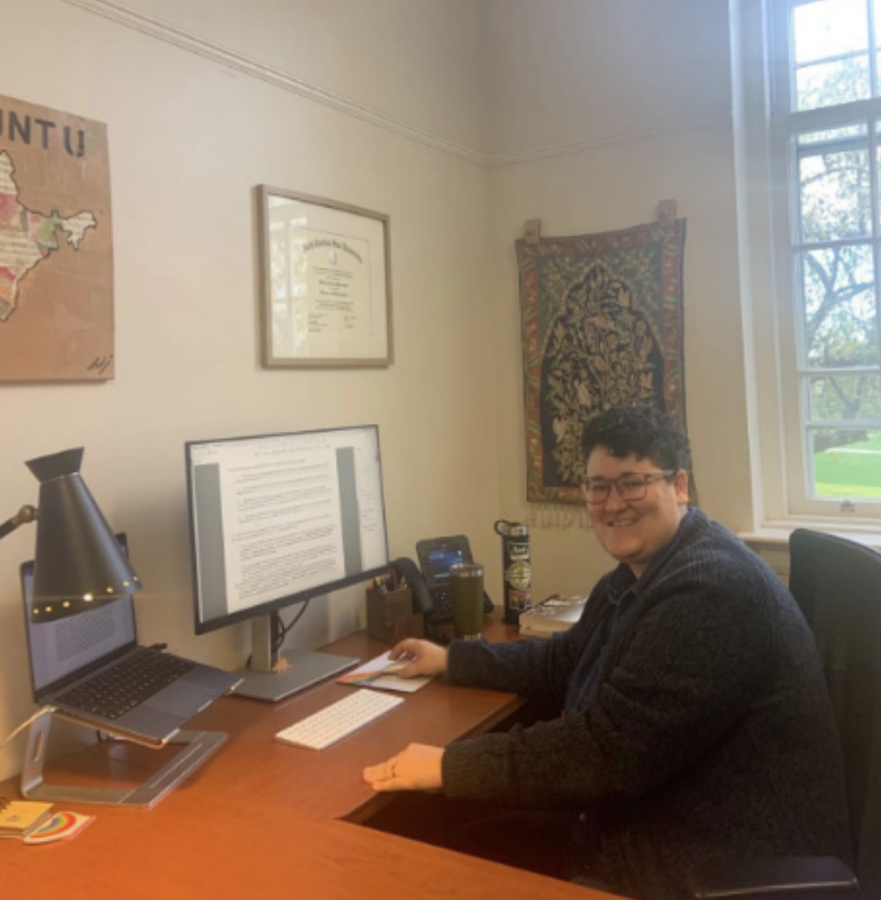Research Lab Spotlight: Mary Guerrant
Professor Mary Guerrant working at their desk. They can be reached at [email protected].
October 20, 2022
Professor Mary Guerrant is a new visiting assistant professor in Psychology and Gender, Sexuality, and Women’s Studies.
Dr. Mary T. Guerrant is originally from Oklahoma, but they have also lived in Louisiana and North Carolina. They earned their PhD in Applied Social and Community Psychology at North Carolina State University in 2017.
The Equity and Inclusion Lab is directed by Dr. Mary T. Guerrant, an applied social and community psychologist passionate about utilizing research as a tool to understand and address social problems, particularly those facing diverse LGBTQ+ populations such as immigrants, Latinx persons, and transgender and gender non-conforming individuals.
As a community psychologist by training, the lab is guided by a focus on research which is strengths-based, participatory, and focuses on empowering historically marginalized populations.
In collaboration with undergraduate research assistants at Union College, the lab focuses on research tied to but not limited to: Sex and sexuality, Gender expression and identity, Race and ethnicity, Equity in mental and physical health (particularly sexual health), Inclusive health promotion and sexual education, Approaches used by minority persons to understand and overcome negative experiences, Social justice and policy.
What is a typical day like in your lab?
Professor Guerrant: I wouldn’t really say there’s a typical day in my lab. Some of my research uses web-based vignette or survey measures, while other projects are community-based which means students are actively working with organizations and/or community members. I often conduct mixed-methods research, meaning it uses a combination of quantitative measures which can be analyzed statistically alongside qualitative methods such as interviews or focus groups. Students in my lab get the chance to experience and build skills in many different research methods.
What projects is the lab currently working on?
Professor Guerrant: The lab is current focused on two projects: LGBTQ+ reproductive and sexual health project and Latinx women’s health project.
The LGBTQ+ reproductive and sexual health project fills a gap in current research by studying health-seeking behaviors for sexual and gender minority women in traditionally heteronormative woman-centered health spaces. The project address the impact of variables such as gender expression, identity disclosure, sense of coherence, and perceived severity and seriousness on likelihood of seeking care in various scenarios related to sexual and reproductive health (e.g. routine preventative care, gynecological cancers, breast cancer, reproductive assistance).
The Latinx women’s health project explores the impact of negative experiences in healthcare settings, such as prejudicial or discriminatory treatment by providers, on future health-seeking behaviors for Latinx women. The project builds upon prior research which focuses on a sense of coherence and communication as factors which mediate and moderate the relationships between past experiences and future behaviors in health-related scenarios.
They anticipate beginning a handful of new projects in the coming months. If you have a project you’d like to pursue, don’t hesitate to reach out to me!
What is it like being a Research Assistant in your lab?
Professor Guerrant: I’m a new faculty member at Union as of this fall, so I’m currently in the process of building my lab. I typically hold weekly or biweekly group meetings with students working in my lab, depending on schedule availability. This gives students a chance to bounce ideas off one another and provide updates or ask questions about their current projects or research tasks. Some of my research projects are web-based, which means students have lots of flexibility to work on tasks around their classes and other obligations. Other projects involve working directly with community-based organizations, which requires a bit more scheduling but is a great way for students to network and see first-hand the impact of their research on the community. I like to know students’ goals and interests so we can collaborate in ways which are mutually beneficial. It’s important to me that students feel supported in the research process and comfortable asking questions or sharing challenges should they come up.
Who can students contact if they’re interested in getting involved?
Professor Guerrant: I’d encourage students interested in getting involved to contact me via email ([email protected]). I’m happy to work with students doing their own research or who would like to be involved as a research assistant with an ongoing project.







